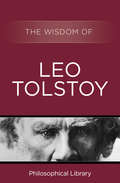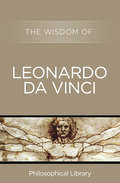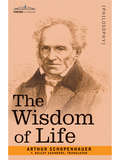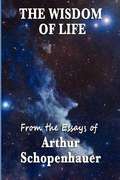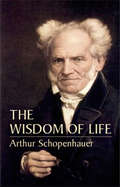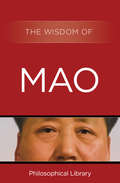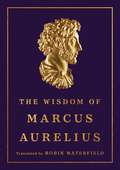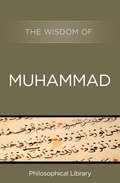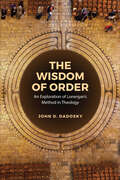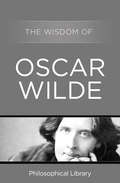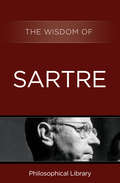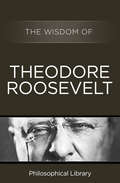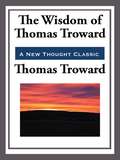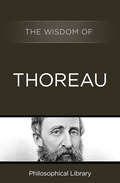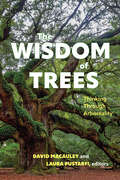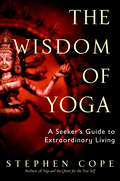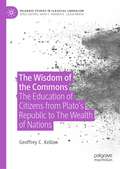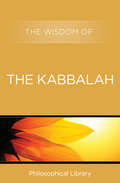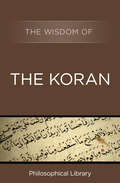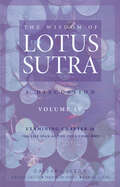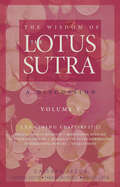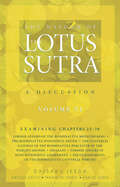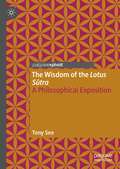- Table View
- List View
The Wisdom of Leo Tolstoy (Wisdom)
by The Wisdom SeriesFollow the renowned novelist&’s journey to his own peace Leo Tolstoy was born to an aristocratic Russian family, became a world-famous influential novelist, and then chose to lead the simple life of a peasant. Dating from this last part of his life, Tolstoy&’s influential book, What I Believe, takes readers along on the path to a life modeled literally on Jesus Christ&’s &“Sermon on the Mount&” and the teachings of the Gospels. In revealing and frank essays he reimagines a faith without dogma, centered solely on Jesus&’s doctrine of love, humility, and self-denial. This collection of chapters from What I Believe includes examinations of Resist Not Evil, Judge Not Thy Neighbor, Letting Go of Fear, and Allowing Forgiveness.
The Wisdom of Leo Tolstoy (Wisdom)
by The Wisdom SeriesFollow the renowned novelist&’s journey to his own peace Leo Tolstoy was born to an aristocratic Russian family, became a world-famous influential novelist, and then chose to lead the simple life of a peasant. Dating from this last part of his life, Tolstoy&’s influential book, What I Believe, takes readers along on the path to a life modeled literally on Jesus Christ&’s &“Sermon on the Mount&” and the teachings of the Gospels. In revealing and frank essays he reimagines a faith without dogma, centered solely on Jesus&’s doctrine of love, humility, and self-denial. This collection of chapters from What I Believe includes examinations of Resist Not Evil, Judge Not Thy Neighbor, Letting Go of Fear, and Allowing Forgiveness.
The Wisdom of Leonardo da Vinci (Wisdom)
by The Wisdom SeriesAn intriguing look inside the mind of the Renaissance genius Leonardo da Vinci stood on a bridge between medieval thought and the modern mind. In this selection of entries from his dozens of coded notebooks and unpublished manuscripts, his unending curiosity in the universe and deep knowledge come through in his energetic style. The self-educated da Vinci developed a philosophical system that set him apart from his contemporaries and marked him as the oracle of a new age, and his vivid imagination and straightforward writing style capture the reader&’s attention whether he is writing about his scientific analysis, his opinion of necromancy, discoveries in nature, or the nature of man. Accompanied by a thorough introduction, The Wisdom of Leonardo da Vinci unveils the man&’s deepest thoughts and musings and proves why he remains an intriguing and enduring figure.
The Wisdom of Life
by Arthur SchopenhauerA disciple of Kant and a significant factor in shaping Nietzsche's thinking, Arthur Schopenhauer worked from the foundation that all knowledge derives from our experience of the world, but that our experience is necessarily subjective and formed by our own intellect and biases: reality, therefore, is but an extension of our own will. In this essay, translated by THOMAS BAILEY SAUNDERS (1860-1928) and first published in English in the 1890s, Schopenhauer explores concepts of what internal driving forces and external interpersonal dynamics contribute to the individual's happiness, from our own personalities to our wealth and social standing. The datedness of some of Schopenhauer's ideas--including a decidedly prefeminist interpretation of women's choices and a connection between fame and reputation that is no longer always active in our celebrity culture--only serve to highlight the philopher's basic assumption of human life: that it is characterized chiefly by misery. Students of philosophy and of 19th-century intellectualism will find this a fascinating read.
The Wisdom of Life
by Arthur SchopenhauerIn this essay from Schopenhauer's final work, Parerga und Paralipomena (1851), the philosopher favors individual strength of will and independent, reasoned deliberation over the tendency to act on irrational impulses. He examines the ways in which life can be arranged to derive the highest degree of pleasure and success
The Wisdom of Life: Being The First Part Of Aphorismen Zur Lebenswiesheit (Mobi Classics Ser.)
by Arthur SchopenhauerA leading German metaphysician of the 19th century, Arthur Schopenhauer (1788–1860) exerted an influence far beyond the hermetic world of philosophy, with adherents ranging from Richard Wagner and Friedrich Nietzsche to Leo Tolstoy and Thomas Mann. Among Schopenhauer's chief contributions to the field of philosophy are his rejection of the idealism of his contemporaries and his embrace of a practical variety of materialism. He jettisons the traditional philosophic jargon for a brisk, compelling style that employs direct terms to express the metaphysics of the will.In The Wisdom of Life, an essay from Schopenhauer's final work, Parerga und Paralipomena (1851), the philosopher favors individual strength of will and independent, reasoned deliberation over the tendency to act on irrational impulses. He examines the ways in which life can be arranged to derive the highest degree of pleasure and success, presents guidelines to achieving this full and rich manner of living, and advises that even a life well lived must always aspire to grander heights. Abounding in subjects of enduring relevance, Schopenhauer's highly readable work appears here in an excellent translation.
The Wisdom of Mao (Wisdom)
by The Wisdom SeriesBeyond the Little Red Book: China&’s revolutionary leader and his philosophy In this collection of essays, China&’s Chairman Mao Tse-Tung explains the interpretation of Marxism-Leninism ideology that became known as Maoism. This philosophy fueled the Chinese Revolution and the massive social and economic changes Mao instituted as the nation&’s leader. From examining the way contradictions can cause great shifts within a society, to the necessity of guerilla-based revolution, Mao mixes his philosophical positions with the history of the Chinese people. Featured works include Relation Between Knowledge and Practice, Between Knowing and Doing, The Universality of Contradiction, The Place of Antagonism in Contradiction, China&’s Historical Characteristics, The Politics of New Democracy, The Economy of New Democracy, The Culture of New Democracy, and more.This collection offers a detailed insight into the mind of the most important figure in twentieth-century Chinese history.
The Wisdom of Marcus Aurelius
by Marcus AureliusAn exquisite abridged edition of Marcus Aurelius's Meditations by a renowned translator Marcus Aurelius Antoninus was the sixteenth emperor of Rome—and by far the most powerful man in the world. His collected thoughts, gems that have come to be called his Meditations, have proved an inexhaustible source of wisdom and one of the most important Stoic texts of all time. In often passionate language, the entries range from one-line aphorisms to essays, from profundity to bitterness. An abridged and portable edition of Marcus Aurelius&’s sage insights, The Wisdom of Marcus Aurelius illuminates one of the greatest works of popular philosophy ever composed.
The Wisdom of Money
by Pascal BrucknerMoney is an evil that does good, and a good that does evil. It is wise to have money, says Pascal Bruckner, and wise to think and talk about it critically. One of the world’s great essayists guides us through the commentary that money has generated since ancient times, as he builds an unfashionable defense of the worldly wisdom of the bourgeoisie.
The Wisdom of Muhammad: The Wisdom Of The Torah, The Wisdom Of The Talmud, The Wisdom Of The Koran, The Wisdom Of Muhammad, And The Wisdom Of Buddha (Wisdom)
by The Wisdom SeriesUncover the tenets of Islam through the words of its founder. This compelling examination of the life and sayings of Muhammad offers the modern reader both a historical context for and a spiritual guide to the principles at the heart of the world&’s second largest religion. Drawing on the Koran and the Sunnah, this collection of quotes is organized by topic from A to Z and provides a window into the eloquence, practicality, and ethical fortitude with which Muhammad preached to his followers. Covering a diverse range of topics, from marriage and civic charity to the individual&’s relationship to God and the afterlife, the Prophet&’s words dispel misconceptions about the history of the faith, its leader, and its core beliefs. With footnotes, a glossary of terms, scriptural citations, and a timeline, The Wisdom of Muhammad is essential reading for anyone who wants to have a true understanding of Islam. &“The ink of the scholar is more holy than the blood of the martyr.&” —Muhammad This ebook edition features a new introduction and image gallery.
The Wisdom of Order: An Exploration of Lonergan’s Method in Theology (Lonergan Studies)
by John DadoskyIn 1972, renowned Canadian philosopher and theologian Bernard Lonergan published Method in Theology. Now, following the fiftieth anniversary of his landmark work, The Wisdom of Order presents the next step in advancing the thought of this significant religious theorist. In addition to the previously compiled Collected Works of Bernard Lonergan, this book aims to provide an appreciation and exploration of Method in Theology. It analyses the first five chapters of the work with commentaries to help readers traverse Lonergan’s thought more effectively and deeply. John D. Dadosky presents compelling exposition and observations to assist readers. The book explores questions related to the philosophical status of beauty, which Lonergan does not address. In addition to Lonergan’s three stages of meaning, the book also seeks to develop a fourth stage that pertains to the turn to alterity emphasizing positive relations with other cultures and religions. As a result, The Wisdom of Order critically analyses an important groundbreaking work while also highlighting areas for further development.
The Wisdom of Oscar Wilde (Wisdom)
by the Wisdom ofA comprehensive selection of his quips, aphorisms, and witOne of the most well known personalities of his day, Oscar Wilde charmed and beguiled readers and audiences with his eloquent and biting observations, his smart quips, and the witticisms peppering his own speech and the speech of his characters. The Wisdom of Oscar Wilde collects both his best-loved quotes and longer excerpts, revealing a man wise to human nature and his times, and never shy with his searing comments on men, women, art, behavior, children, politics, youth, and a range of other topics. Drawing from his plays, articles, reviews, speeches, letters, and other works, this definitive volume is an entertaining immersion into the world of this charming genius.
The Wisdom of Sartre (Wisdom)
by The Wisdom SeriesAn invaluable introduction to the leading French intellectual of the twentieth century The Wisdom of Sartre offers key excerpts from the eloquent French writer, playwright, and philosopher&’s masterpiece, Being and Nothingness. From this collection, readers will discover the strongest themes in his early philosophical work: an ontological account of what it means to be human, and the role of perception, knowledge, and consciousness in the practical demands of life. Sartre&’s view that man&’s freedom is a unique source of both misery and pleasure and that the question of which will prevail depends on man&’s awareness and commitment to his freedom is both thought provoking and timely.
The Wisdom of Theodore Roosevelt
by Philosophical LibraryA fascinating portrait of a dynamic figure in American history Few American presidents stand as such vivid personalities in our history as Theodore Roosevelt. Through this selection of quotations and excerpts, drawn from his speeches, articles, letters, and other writing, this vibrant thinker, politician, outdoorsman, and more relays his passionate feelings on a wide array of subjects. Provided by topic and in chronological order, Roosevelt's quotations show his evolving beliefs on everything from the strenuous life to the bully pulpit, childhood to imperialism, religion to his daughter, Alice. Throughout, the modern reader comes to understand how Roosevelt saw deeply into American society and its problems, and willed the people to mobilize and deal with issues head on.
The Wisdom of Thomas Troward
by Thomas TrowardIncluded here are The Edinburgh Lectures on Mental Science, The Dore Lectures on Mental Science, The Law and the Word, and The Creative Process in the Individual. Thomas Troward was an early New Thought writer who had an immense impact on those who would follow. Ernest Holmes, Frederick Bailes, Joseph Murphy, and Emmett Fox cited him as a major influence, and Genevieve Behrend was his student. It is impossible to over estimate his importance to the New Thought movement. His intense fusion of Eastern and Western philosophy is unmatched. The Law and the Word explores the connection between thought energy, scientific reasoning, and creative power. The Creative Process in the Individual scientifically explains the sequence of creative activity starting from the beginnings of life through the development of mankind. The Edinburgh and Dore Lectures on Mental Science are required reading for anyone wishing to understand and control the power of the mind.
The Wisdom of Thoreau (Wisdom)
by The Wisdom SeriesA collection of wise words on solitude, simplicity, nature, and life at Walden from the leader of the transcendentalist movement. In excerpts collected here from his most important works, Henry David Thoreau documents his experiences in nature and the wisdom he finds in his explorations of sound, reading, solitude, and other aspects of leading a simple life at Walden. A fearless individualist, Thoreau explored not only poetic naturalism but also a number of ideas that were groundbreaking for his day, including civil disobedience and environmentalism. This introduction to one of America&’s great thinkers shows that as an essayist and poet-philosopher Thoreau remains a relevant voice in the never-ending quest of man to understand his place in the natural terrain.
The Wisdom of Trees: Thinking Through Arboreality (SUNY series in Environmental Philosophy and Ethics)
by David Macauley; Laura PustarfiPioneering essays that reveal the significance of new interdisciplinary understandings of trees and forests, especially in terms of their philosophical and ecological dimensions and their importance for addressing the climate emergency.This is the first book to apply philosophical thinking to trees. Through a series of sixteen diverse essays by leading scholars and writers, along with an in-depth introduction to the key issues and ideas, it examines the new and emerging understanding of trees in science and society. Contributors show how these developments encourage a revisioning of philosophical thought and a more sustainable relationship with trees and forests-a reconceptualization with important ecological and social implications for responding to deforestation, the loss of biodiversity, and the climate emergency. The interdisciplinary contributions in this collection investigate the many interconnected dimensions of arboreality, focusing on subjects related to time, mind, truth, memory, being, beauty, goodness, silence, wisdom, personhood, and death. The volume engages in a conversation about why trees matter, how they can best be protected, our obligations to them, and even what or who they are. Most of the chapters are informed by natural history or ecological science and many share a particular emphasis on continental philosophy and the environmental humanities.
The Wisdom of Yoga: A Seeker's Guide to Extraordinary Living
by Stephen CopeFor modern spiritual seekers and yoga students alike, here is an irreverent yet profound guide to the most sophisticated teachings of the yoga wisdom tradition–now brought to contemporary life by a celebrated author, psychotherapist, and leading American yoga instructor.While many Westerners still think of yoga as an invigorating series of postures and breathing exercises, these physical practices are only part of a vast and ancient spiritual science. For more than three millennia, yoga sages systematically explored the essential questions of our human existence: What are the root causes of suffering, and how can we achieve freedom and happiness? What would it be like to function at the maximum potential of our minds, bodies, and spirits? What is an optimal human life?Nowhere have their discoveries been more brilliantly distilled than in a short–but famously difficult–treatise called the Yogasutra. This revered text lays out the entire path of inner development in remarkable detail–ranging from practices that build character and mental power to the highest reaches of spiritual realization. Now Stephen Cope unlocks the teachings of the Yogasutra by showing them at work in the lives of a group of friends and fellow yoga students who are confronting the full modern catastrophe of careers, relationships, and dysfunctional family dynamics. Interweaving their daily dilemmas with insights from modern psychology, neuroscience, religion, and philosophy, he shows the astonishing relevance and practicality of this timeless psychology of awakening.Leavened with wit and passion, The Wisdom of Yoga is a superb companion and guide for anyone seeking enhanced creativity, better relationships, and a more ethical and graceful way of living in the world.
The Wisdom of the Commons: The Education of Citizens from Plato’s Republic to The Wealth of Nations (Palgrave Studies in Classical Liberalism)
by Geoffrey C. KellowThe Wisdom of the Commons examines the history and philosophy of civic education as the essential political part of liberal education. This study distinguishes itself from other works on liberal and civic education by focusing explicitly on the civic and liberal education of those citizens who are not destined for prominent positions within politics and government but are still a part of and relevant to political society. It considers this strand of liberal and civic education, in both its ancient and modern iterations, by focusing on the philosophies of Plato, Cicero, Locke, Rousseau, and Adam Smith.
The Wisdom of the Kabbalah (Wisdom)
by The Wisdom SeriesExplore the third of the great literatures in Judaism While many readers may have heard of Kabbalah in recent years, how many understand the origins and unique perspective of this collection of Jewish mystical beliefs? Handed down in the oral tradition for thousands of years and transcribed in fourteenth-century Spain, the Kabbalah is the classical expression of Jewish mysticism. This collection draws from the main work of Kabbalah—Sepher ha-Zohar, or The Book of Splendor—and offers insight into the great body of Hebrew literature that sprang up and grew parallel to the traditional writings of rabbinical literature. Written in the dialectic style as a commentary to the Torah, the Kabbalah examines man&’s mystical union with God in thoughts of wisdom and deeds of kindness through a symbol-laden examination of the God before creation. A mix of ethics and mysticism, Kabbalah&’s wisdom is frequently imparted through gematria, or a symbolic language based in numbers that correspond with the letters of the Hebrew alphabet. This ebook features a new introduction, image gallery, and index of the Hebrew alphabet.
The Wisdom of the Koran: The Wisdom Of The Torah, The Wisdom Of The Talmud, The Wisdom Of The Koran, The Wisdom Of Muhammad, And The Wisdom Of Buddha (Wisdom)
by The Wisdom SeriesDiscover the beliefs and lessons of Islam&’s sacred textThe Koran, the sacred text at the heart of the second-largest religion in the world, is regarded by Muslims as the exact word of God as revealed to the prophet Muhammad. Representing the ultimate authority on almost every issue related to Muslim life, the Koran&’s lessons and parables offer the faithful moral and spiritual guidance. In The Wisdom of the Koran, readers will discover a selection of key chapters such as &“The Night Journey&” and &“The Cave,&” footnotes to convey context and meaning, as well as several stories from Judeo-Christian history. This invaluable anthology is an excellent step toward greater understanding of one of the finest pieces of Arabic prose and the Muslim faith.
The Wisdom of the Lotus Sutra, vol. 4: A Discussion (Wisdom of the Lotus Sutra)
by Daisaku IkedaThe Lotus Sutra, Shakyamuni Buddha's highest teaching, explainsthat all people—regardless of gender, social status or education—canuncover the Buddha nature they inherently possess. Based on thisempowering and compassionate sutra, Nichiren Daishonin revealedthe supreme practice for the modern world.Now, in clear, down-to-earth terms, SGI President Ikeda and SokaGakkai Study Department leaders Katsuji Saito, Takanori Endo andHaruo Suda explore the profound meaning of the Lotus Sutra'stwenty -eight chapters. Basing themselves on Nichiren Daishonin's lectureson the Lotus Sutra, The Record of the Orally Transmitted Teachings,they explain the concepts that form the foundation of SGImembers' Buddhist practice. Through their discussions, the ancienttext of the Lotus Sutra comes alive, brimming with profound significanceand practical advice for living in today's world.Volume four covers chapter 16 of the twenty-eight chapter Lotus Sutra.
The Wisdom of the Lotus Sutra, vol. 5: A Discussion (Wisdom of the Lotus Sutra)
by Daisaku IkedaThe Lotus Sutra, Shakyamuni Buddha's highest teaching, explainsthat all people—regardless of gender, social status or education—canuncover the Buddha nature they inherently possess. Based on thisempowering and compassionate sutra, Nichiren Daishonin revealedthe supreme practice for the modern world.Now, in clear, down-to-earth terms, SGI President Ikeda and SokaGakkai Study Department leaders Katsuji Saito, Takanori Endo andHaruo Suda explore the profound meaning of the Lotus Sutra'stwenty -eight chapters. Basing themselves on Nichiren Daishonin's lectureson the Lotus Sutra, The Record of the Orally Transmitted Teachings,they explain the concepts that form the foundation of SGImembers' Buddhist practice. Through their discussions, the ancienttext of the Lotus Sutra comes alive, brimming with profound significanceand practical advice for living in today's world.Volume five covers chapters 17-22 of the twenty-eight chapter Lotus Sutra.
The Wisdom of the Lotus Sutra, vol. 6: A Discussion (Wisdom of the Lotus Sutra)
by Daisaku IkedaThe Lotus Sutra, Shakyamuni Buddha's highest teaching, explainsthat all people—regardless of gender, social status or education—canuncover the Buddha nature they inherently possess. Based on thisempowering and compassionate sutra, Nichiren Daishonin revealedthe supreme practice for the modern world.Now, in clear, down-to-earth terms, SGI President Ikeda and SokaGakkai Study Department leaders Katsuji Saito, Takanori Endo andHaruo Suda explore the profound meaning of the Lotus Sutra'stwenty -eight chapters. Basing themselves on Nichiren Daishonin's lectureson the Lotus Sutra, The Record of the Orally Transmitted Teachings,they explain the concepts that form the foundation of SGImembers' Buddhist practice. Through their discussions, the ancienttext of the Lotus Sutra comes alive, brimming with profound significanceand practical advice for living in today's world.Volume six covers chapters 23-28 of the twenty-eight chapter Lotus Sutra.
The Wisdom of the Lotus Sutra: A Philosophical Exposition
by Tony SeeThe Lotus Sūtra is one of the most important sūtras in Mahāyāna Buddhism. Translated by Kumārajīva in the 5th century, its teachings have inspired many Buddhist scholars such as Chih-i and Saichō from the Tiantai (Tendai) tradition, Dōgen from the Zen tradition and Nichiren the 13th century Kamakura founder and reformer. There is a relative lack of scholarly works that are devoted to an examination of how its philosophical ideas were received and developed throughout history. This book remedies that lack by tracing the origin and development of Lotus Sūtra thought, and interprets the text from the perspective of the doctrine of Buddha-nature in Mahāyāna Buddhism.
